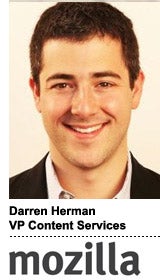 Mozilla wants to build content personalization into future generations of its products, and has recruited MDC Partners’ Darren Herman to lead that charge as VP for content services.
Mozilla wants to build content personalization into future generations of its products, and has recruited MDC Partners’ Darren Herman to lead that charge as VP for content services.
Herman – a digital agency exec and startup entrepreneur – will head up a brand new Content Services division focused on building out a content experience within the Firefox browser and operating system. If it succeeds in doing so, Herman said Mozilla will consider “additional forms of content, including but not limited to advertising,” down the road.
For now, he said creating a paid media business for Mozilla Corporation – a commercial subsidiary of Mozilla Foundation – is not the explicit goal.
“If the browser is going to be a smart agent, which it is in Mozilla’s road map, we’ll have ample opportunity to personalize the experience to deliver value that browsers have never done before,” Herman told AdExchanger.
Herman will work globally and recruit a team of people to staff its content unit, of which he is the first employee. (The second is Lara Fischer-Zernin, Herman’s executive assistant at MDC, who is making the leap to Mozilla with him.) He starts Dec. 2 and will report to Harvey Anderson, Mozilla’s SVP of business and legal affairs.
“We are very excited to have Darren join Mozilla,” Anderson said in a statement. “He will bring a unique perspective to advance our open Web initiatives across the digital media ecosystem and help generate new opportunities to put the user in control of their Web experience.”
In addition to his content role, Herman will function as an ad industry ambassador for Mozilla – explaining its position to advertisers, ad sellers and ad-tech companies.
“The goal is to create a more common understanding of Mozilla’s role and for Mozilla to understand the ad-tech ecosystem, given its work with third-party cookies, Do Not Track, user personalization and other services,” he said of his industry outreach duties.
Such a function is necessary, as Mozilla has a reputation around its ad blocking. Herman, however, is well-liked in both the agency and ad-tech spheres and has been a key advocate of programmatic media. Among other projects, he co-founded MDC’s Varick Media Management trading desk and its kps+ Ventures investment arm. Earlier he founded his own company, IGA Worldwide.
Mozilla has opened up to the advertising industry somewhat in recent months, granting a handful of trade press interviews and speaking at some industry events. That kind of outreach, advanced by Herman, may also support a growing network of partnerships.
“If we put the user in the center of this smart Web agent, which is the browsing agent … you’ll see that browser becoming much smarter. In order to capture every type of user, we need a broad range of partnerships,” he added.
A self-professed Mozilla fanboy, Herman says he was not seeking a new job when Mozilla came knocking earlier this year, but he found himself excited by the opportunity to help the company retool for mobile and invent the future.
Adding content services revenue – be it from ads, subscription fees or something else — would help Mozilla meet the key goal of diversifying income beyond its key search partnership with Google. Mozilla’s revenues nearly doubled in 2012 to $311 million, thanks to a renegotiation of its Google contract. Adding new businesses as it seeks to make the transition to mobile only makes sense as a self-preservation move.
Speaking broadly about ad industry trends and how Mozilla might fit into them, Herman noted pressure on CMOs has become so great that any company selling advertising must be able to measure and optimize to help CMOs prove the value of marketing spend.
“If we were ever to get into that game, we need to be smart about how we do that to help our CMOs and help the industry understand how to return their dollars,” he said. “That would make us a good partner. Until we feel like we can be a good partner, we will probably sit on the sidelines.”














